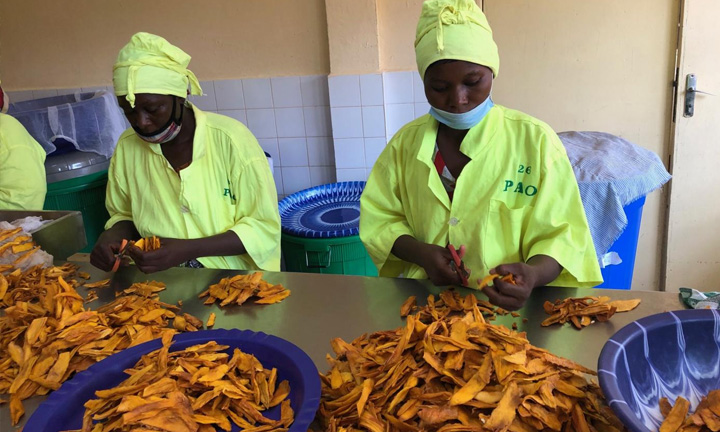PHOTO: Marie-France Boucher and Daniel K. Kalinaki, Trade4Devnews
Between March and July every year, fruit trees across Burkina Faso, a landlocked country in West Africa, come alive with the delightful smells and colorful sights of mangos.
The warm air from the Sahel turns the fruit from green to shades of yellow and orange bursting with ripe goodness. Trees sag from the weight of mangos, and from children climbing into their branches to eat the unforbidden fruit. In the western part of the country the fruit trees are so plentiful and grow naturally, the mangos drop to the ground like manna from the sky.
This heavenly delight is also big earthly business. Mangos account for more than half the fruit grown in the country where eight out of every 10 people live off agriculture.
The real value, however, is foreign exchange earnings from exporting the stuff to Europe, Asia, and neighboring countries. Fresh mangos are sinfully delicious but hard to transport to these export markets without losing freshness. Salvation lies in processed and dried mango products, which have been growing over the past decade.
Production of dried mango increased from 700 tons in 2014 to 3,800 tons in 2020, leading to a 50% increase in export revenue in that period.
Aware of the premium on value-added exports, the government of Burkina Faso between 2014 and 2018 partnered with the Enhanced Integrated Framework (EIF) to improve the drying and certification process of dried mangos for export. The project has been key to slowly but firmly pushing the country towards modernizing its agro-processing businesses – and juicing up its exports.
Adding value
Generally, processed goods enjoy greater price stability than raw commodities, making their export less risky. This expands market opportunities and contributes to more secure incomes for workers across the value chain, many of whom often live in rural areas.
Exporting dried mangos is a profitable alternative to exporting fresh ones as the quality of the latter is often compromised during transport due to poor logistics, like lack of air cargos, or high costs of refrigerated containers. Drying also reduces post-harvest losses, which means more money for producers, processors, and exporters.
Exporting dried mangos also removes barriers associated with exporting fresh produce and ensures more control over the quality of the final product that customers buy.
However, the process of drying mangos is not always straightforward. Mr. Soulemane Pierre Sodre, coordinator of the EIF National Implementation Unit at the Ministry of Industry, Trade and Handicrafts of Burkina Faso, says that if not operated properly, dryers can cause fires and damage processing units.
The project improved the drying process by building new processing units. It also bought and installed new dryers in existing units. Workers were trained to operate dryers as well as understand and apply good processing practices and sanitary standards.
These changes strengthened the mango value chain and increased the quality of the final products. The number of processing units doubled to 100 while packaging units grew from one to six. This expanded opportunities across the entire value chain, which now employs more than 12,000, including 600 permanent positions.
“Before the project in 2014, our average annual turnover was $3.5 million and has now risen to $9.3 million,” said Mamadou Ouattara, president of the Association for Mango Processing Professionals of Burkina Faso. “The income of our workers increased, which made a huge difference to their lives.”
The cooperative association has been operating since 2008 and includes most mango transformation units in the country. It focuses mainly on drying mango but also supports the production of mango juice, syrup, and vinegar. It maintains a close relationship with producers across the country and, by processing the mangos close to the farms, reduces waste and the time between harvest and processing.
Structural transformation
For a country heavily dependent on commodities like gold and cotton for exports, mangos are a sweet addition to Burkina Faso’s balance sheet. Burkinabe dried mango now enjoys 25% market share in Europe.
Beyond export market share, however, the game-changing value of agro-processing is its drive towards industrialization and adding value to commodities, which are key to economic development. Agro-processing puts a country a step closer to developing its manufacturing sector, and ultimately faster growth.
It will take a lot more than a few drying units to industrialize Burkina Faso, and the mango sector still faces financing challenges. But the new Africa Free Continental Trade Area reiterates the importance of industrialization and regional trade for the continent’s sustainable development.
By slicing, dicing, drying and exporting, Burkina Faso is showing it can achieve this, one mango at a time.

